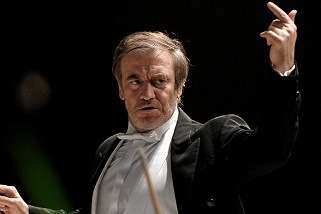|
Back
The Vienna Phil Arrives at Carnegie with Russian Flair New York
Isaac Stern Auditorium, Carnegie Hall
02/26/2016 - & February 22 (Wien), March 1st (Naples FL), 8 (São Paolo), 2016
Richard Wagner: Overture to Der fliegende Holländer
Claude Debussy: La Mer
Modest Mussorgsky: Pictures at an Exhibition (orch. Ravel)
The Vienna Philharmonic Orchestra, Valery Gergiev (conductor)

V. Gergiev
The Vienna Philharmonic’s annual residency at Carnegie Hall is a highlight of any New York season, featuring a weekend of three concerts led by a celebrity guest conductor in programs that mix classic chestnuts with pieces from more specialized repertoire. This year it was the energetic Russian (actually Ossetian) conductor Valery Gergiev’s turn. Russian culture buzzed in New York, perhaps by coincidence, with star soprano Anna Netrebko singing at the Metropolitan Opera and the Brooklyn Academy of Music hosting several Mariinsky Ballet performances and a Russian-language run of Chekhov’s The Cherry Orchard from one of St. Petersburg’s leading dramatic theaters. As director of St. Petersburg’s Mariinsky Theater, it should be unsurprising that Gergiev chose heavily operatic programs. The first concert, reviewed here, opened with a blazing performance of the overture to Wagner’s first "mature" opera, Der fliegende Holländer. Having championed Wagner after decades of neglect in his home country, for the obvious political reasons, Gergiev has led productions of eight of the composer’s ten major works at home and on international stages. His approach to Wagner is idiosyncratic, sometimes resulting in a delectably slow and luxuriant reading (as heard in the Parsifal excerpts featured in this year’s third concert) that recalls the hand of James Levine, and sometimes a driving, bombastic interpretation, as heard in this selection. The power of the brass and strings was palpable, though Gergiev’s verve often threatened to overwhelm the gentler and more delicate elements so essential to the plot’s themes of self-sacrifice and redemption.
Moving on to Debussy’s inventive depiction of the sea in its various moods, Gergiev proved more sensitive but the reading was still more forceful than any other I have ever encountered. And again, some of the necessary delicacy that a French conductor might bring to the score was lost in translation.
It was in the concert’s final piece, Mussorgsky’s famous Pictures at an Exhibition that Gergiev found his true idiom. A series of musical notes reacting to a friend’s paintings, the piece resounds with a processional theme that suggests the grandeur of Russia’s imperial history tempered by deeply human insight into a range of places and characters found within it. Here Gergiev maximized the strengths of the Viennese players in all their rosy resonances. It would be hard to imagine a better performance even in Russia.
The concert unfolded with no reason for disappointment, and the addition of Strauss’s Emperor Waltz and Pleasure Train Polka ended the evening with vivacious relief after the heavy Mussorgsky piece. But there can be no mistake where Gergiev’s strengths truly lie. As if to emphasize the point, a small crowd of protesters gathered before Carnegie Hall’s front entrance to remind concertgoers and casual passersby of his relationship with Russian leader Vladimir Putin and his controversial policies. Politics was refreshingly far from the agenda, but not everyone is swept away by the music.
Paul du Quenoy
|